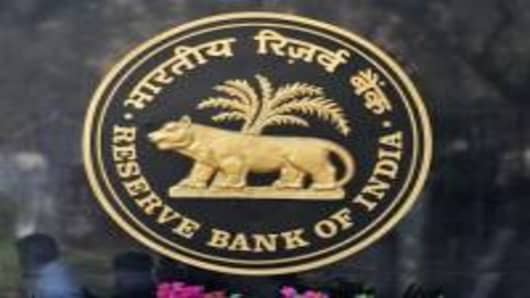Recent policy reforms by the Indian government to boost investment and rein in fiscal spending have raised speculation that the country's central bank will do its part to revive economic growth by easing monetary conditions at its rate-setting meeting on Tuesday.
However, economists say the Reserve Bank of India is unlikely to bow to pressure so soon, as a rate cut would trigger further inflationary pressures and risk bringing the rupee under renewed pressure.
"The Reserve Bank will wait for inflation to resume a downward path, which is unlikely before 2013. Even then we see room for rates to be cut only modestly, from 8 percent to 7.5 percent, during the course of next year," Andrew Kenningham, senior global economist at Capital Economics, wrote in a report.
Despite a sharp slowdown in economic growth, the RBI – which last reduced interest rates in April – has resisted aggressive policy easing in the recent months as inflation worries remain at the forefront.
Wholesale price inflation, India's main inflation gauge, spiked to 7.8 percent in September – the highest level in 10 months – driven by the government's recent diesel price hike, and is expected to touch 8 percent in the coming months.
Sonal Verma, an India economist at Nomura, agrees that the central bank has no room to cut policy rates this time around, even as the latest government reforms put the ball in the central bank's court to enact growth-friendly policies.
Since September, the government has announced a slew of measures aimed at increasing investment in the country - including raising the foreign direct investment (FDI) limit in sectors ranging from broadcast to insurance.
Separately, over the weekend, Prime Minister Manmohan Singh engaged in a major reshuffling of the Congress-led United Progressive Alliance Cabinet, inducting 22 ministers - 17 of whom were new faces – a sign, some say, underscores the government's resolve to push through deeply-unpopular reforms.
(Read More: India Wins Over Markets, but Now Comes the Hard Part)
"The current set of reforms opens a window for the RBI to act on monetary policy. However, RBI action will be calibrated and a loosening of monetary policy will only be gradual," Verma said.
A rate cut could also send the rupee hurtling back downwards, some analysts warn. The currency, which depreciated 9.5 percent after the central bank last lowered rates in April, has rebounded 3 percent since the reforms were announced in September.
Weakness in the rupee is negative for the India's fiscal deficit, as the country imports 70 percent of its crude oil needs.
Other analysts argue that a rate cut, unlike the fundamental structural reforms, will do little to boost the economy.
(Read More: Why India's Most Promising Sectors Fail to Deliver)
"Policy reforms that bolster the regulatory environment, increase legal certainty, accelerate various project approvals, and create the right incentives to invest are more important," said Chetan Ahya, Asia-Pacific Economist at Morgan Stanley.
Still, as a compromise, Verma of Nomura says the central bank could announce a 25 basis point cut to the cash reserve ratio (CRR) - the amount of deposits lenders must set aside as reserves. The RBI last cut the CRR in September in an effort to boost liquidity.
But India watcher Robert Prior Wandesforde, director of Asian economics at Credit Suisse, believes the RBI will go further to and reciprocate government efforts with a rate cut.
"Our rationale is that the central bank will want to give the government a pat on the back for its recent reform measures and its apparent willingness to stick with them in the face of significant public and popular discontent," he said.
"For this particular meeting, and probably for this meeting only, we believe the focus will not be on the very latest inflation trends," he added.
The government has stepped up calls for the central bank to ease policy in the recent weeks, with Finance Minister Palaniappan Chidambaram on October 13 calling on the RBI to take "calibrated risks" to support growth.
By CNBC's Ansuya Harjani



